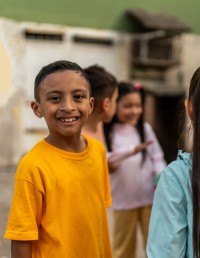Latest News
Flores Counsel File Supplemental Brief in Support of Motion to Block Regulations Governing the Detention of Migrant Children
August 30, 2019
The National Center for Youth Law (NCYL) and co-counsel filed a supplemental motion on Friday, August 30 to block the Administration's Apprehension, Processing, Care and Custody of Alien Minors and Unaccompanied Alien Children final regulations. These regulations are an attempt to dismantle the Flores Settlement Agreement, which has stood for decades as the standard of protection for children in immigration custody.
Supplemental Memorandum in Support of Motion to Enforce SettlementFREQUENTLY ASKED QUESTIONS What is the Flores Settlement? The 1997 settlement agreement in Flores v. Reno set national standards for the treatment and placement of minors in what was then Immigration and Naturalization Service (INS) custody. INS obligations under the agreement are now the responsibility of the Department of Homeland Security (DHS) and the Department of Health and Human Services' Office of Refugee Resettlement (ORR). The Settlement establishes minimum standards for initial detention and a policy favoring release of minors. It also requires that children who remain in federal custody be placed in the least restrictive environment in state-licensed programs, and also mandates the provision of certain services. The Flores Settlement terminates only if replaced by regulations that implement the terms of the Settlement. What protections are required under the Flores Settlement?
Declarations in Support of Plaintiffs' Motion to Enforce Settlement
[Proposed] Order Enforcing Settlement Notwithstanding Publication of Final Rule
- Children must be released “without unnecessary delay” to a sponsor, which may be a parent, relative, designate of the parent, or responsible adult, as deemed appropriate.
- Children must be held in the “least restrictive setting” appropriate, based on his or her age and needs.
- Minors in custody of the Department of Homeland Security (Immigration and Customs Enforcement or Customs and Border Patrol) must be released to an appropriate adult or transferred to the custody of the Office of Refugee Resettlement (ORR) and placed in a non-secure, licensed program within three to five days of apprehension except under extraordinary circumstances.
- A licensed program is defined as one that is state licensed and in compliance with state child welfare laws and regulations. Licensed programs must provide certain services for each child in its custody, including suitable living accommodations, food, clothing, medical care, education, recreation, counseling, privacy, and visitation rights.
- Detained children are entitled to judicial review of placement decisions and must be informed of this and all other legal rights conferred under the settlement.
- Flores Counsel are entitled to access all facilities detaining children to monitor compliance with the Settlement's terms and interview children.
- They permit the Department of Homeland Security to detain children indefinitely.
- They allow the Department of Homeland Security to detain children in substandard facilities without state licensing.
- They strip children's rights to judicial review of decisions to detain them in lieu of release to parents and other available custodians and decisions to transfer them from licensed dependent care facilities to a juvenile hall or psychiatric detention facility.
- They remove any independent oversight of DHS in detaining migrant children and instead replaces this with the power to self-license and inspect.





